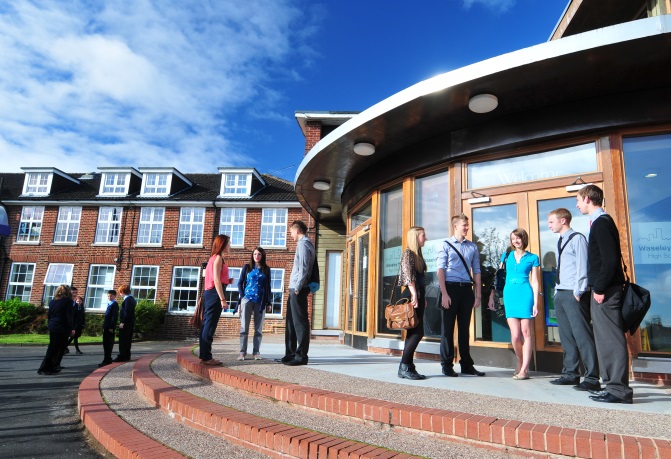- Latest NewsUp-to-date articles giving you information on best practice and policy changes.
- Model PoliciesA comprehensive set of templates for each statutory school policy and document.
- Skills AuditsEvaluate your skills and knowledge, identify gaps and determine training needs.
Developing middle leaders - a sustainable approach to school improvement
Waseley Hills High School got out of ‘requires improvement’ by developing and challenging their staff – not by hiring and firing. Read about how they put sustainable leadership into practice

School information
School: Waseley Hills High School
Location: Birmingham
Number of pupils on roll: 804
Headteacher: Allan Roll
Category: Academy converter
Level of PP: below average
Level of SEN: above average
Comments from Ofsted
‘The new leaders of English, mathematics and science have been able to galvanise staff enthusiasm through their leadership of these subjects, ensuring greater consistency of practice, for example in lesson planning. This has shown a positive impact on raising achievement and the quality of teaching in these subjects, particularly in science.’ (Leadership and management)
Many schools who improve do so by changing their staff. Hiring and firing is becoming a much more common practice in schools than previously. Such strategies do not always lead to long term sustainable improvement. For this, changes in culture are needed that don’t necessarily come with a new member of staff.
At Waseley Hills High School, headteacher Alan Roll and his governing body knew that there was plenty of potential to bring the school into the ‘good’ category. Alan joined the school six years ago as headteacher and is proud of the fact that the improvement noted by inspectors has been achieved without a high staff turnover.
We’ve chosen to develop the staff rather than recruit new members
‘We’ve chosen to develop the staff rather than recruit new members,’ Alan explains. ‘It’s perhaps a slower process but it is more sustainable.’ The school has developed a climate that nurtures younger members of staff and develops the skills they need as middle leaders.
The majority of subject leaders have stayed in post during the past six years and of the new heads of core subjects, two are internal appointments. ‘We did appoint an external candidate as an English co-ordinator,’ says Alan, ‘but we promoted the existing head of English in another capacity, as a member of the senior leadership team.’
Enabling risk
Waseley Hills High School has invested a lot in improving pedagogy and CPD. ‘We want staff to share their ideas and experiment,’ explains Alan. ‘It’s important that they feel sufficiently confident to try something new.’ An element of risk-taking is encouraged and strategies have been adopted that make staff more confident in doing this.
‘Our lesson observation system means that if a lesson goes wrong because someone has tried something a little differently, they are not penalised for it,’ says Alan. ‘Instead they can ask to have another observation. We want ideas that are outside the box too.’
Autonomy
Alan is keen to ensure that his middle leaders have autonomy. The seven department heads and SENCO have their own school improvement meetings and create their own agenda for this. There is an internally rotating chair and feedback is then provided from the meeting to the SLT. ‘I want them to take control of the on-the-ground issues rather than imposing change on them,’ says Alan. ‘It’s a case of planting the idea and letting it grow.’
There is accountability though too. ‘They have to be able to deliver. There are regular meetings between myself, the assistant head and department heads. We look at data and tell the story of what’s happening. A key driver of school improvement is improving your middle leaders through a mixture of support and challenge.’
These meetings take place three times a year at the beginning of each term and are backed up by a good data team who helps everyone to understand what the data means. A raising achievement meeting for English and maths takes place once a fortnight during which senior leaders focus on the level of progress in these subjects.
They have to be able to deliver
A collaborative approach
Waseley Hills High School is part of the Redditch and Bromsgrove Trust and makes use of this collaboration to share expertise. ‘It’s about getting people out to see what there is,’ Alan explains. ‘It was particularly successful when we organised CPD days so that members of staff could go out and visit other schools with outstanding practice. They then came back and provided feedback for everyone. We did the same with the teaching assistants.’
Support from South Bromsgrove Teaching School has been particularly beneficial with two members of staff completing the National Professional Qualification for Middle Leadership (NPQML) from there. This combination of day release, evening sessions and on-the-job application was particularly useful for Waseley’s head of music who was leading the department with limited experience. The staff found the input from the teaching school to be excellent.
Advice
‘Middle leaders are very important. I agree with Ofsted on that,’ says Alan. He refers to Ofsted’s annual report which identified ineffective middle leadership as one of the common problems preventing secondary schools from improving further. ‘My advice if there is a problem with your middle leaders is to look at what the barriers are. Are they lacking skills or confidence? How can you grow them? Think hard before removing anyone. It’s not about 100% change, it’s about 100 people changing by 1%.’
Last Updated:
18 Mar 2015


